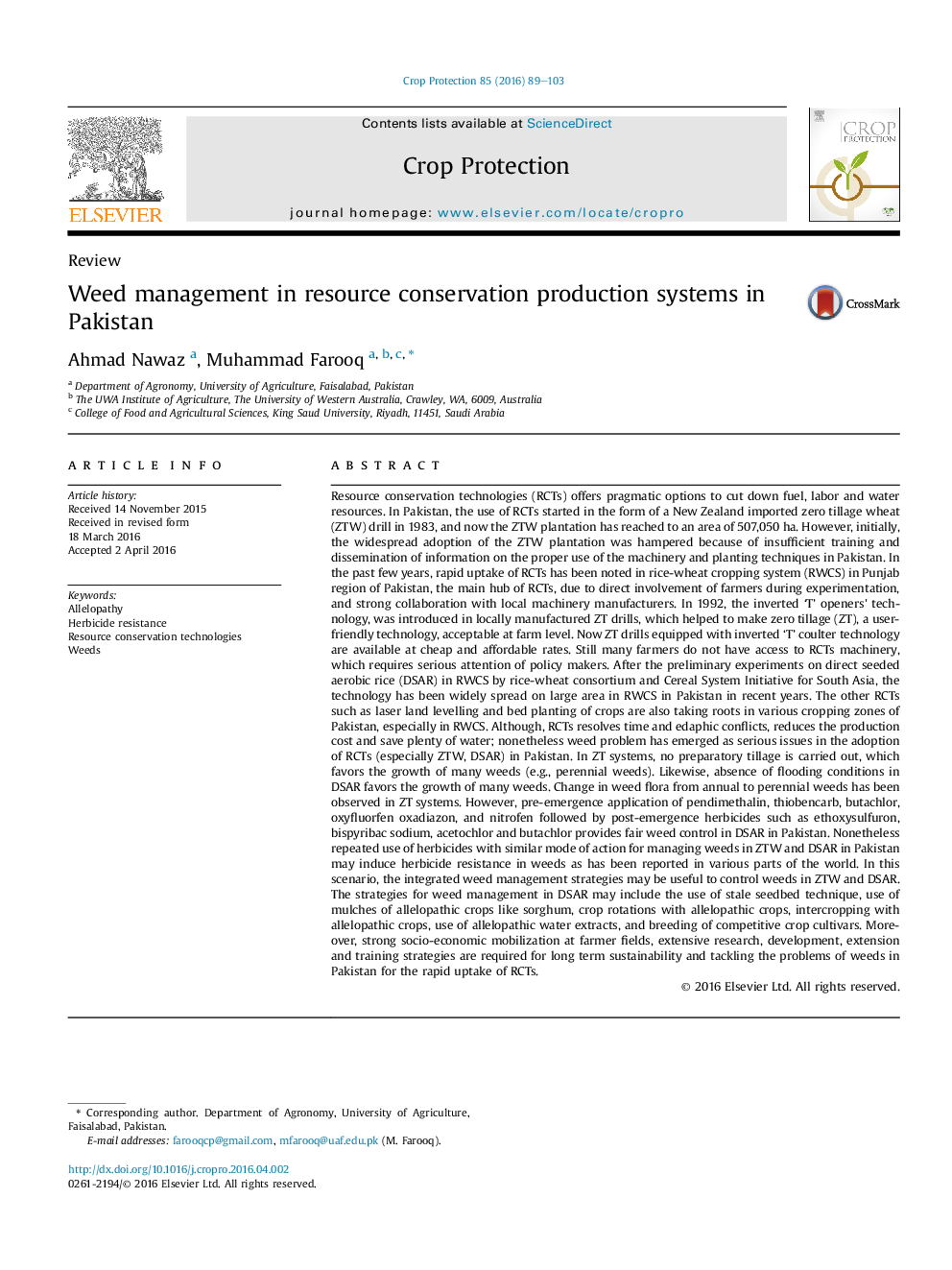| کد مقاله | کد نشریه | سال انتشار | مقاله انگلیسی | نسخه تمام متن |
|---|---|---|---|---|
| 6373315 | 1624302 | 2016 | 15 صفحه PDF | دانلود رایگان |
عنوان انگلیسی مقاله ISI
Weed management in resource conservation production systems in Pakistan
ترجمه فارسی عنوان
مدیریت علفهای هرز در سیستم های حفاظت از منابع پاکستان در پاکستان
دانلود مقاله + سفارش ترجمه
دانلود مقاله ISI انگلیسی
رایگان برای ایرانیان
کلمات کلیدی
آللوپاتی، مقاومت علف کش، فن آوری های حفاظت منابع علف های هرز
موضوعات مرتبط
علوم زیستی و بیوفناوری
علوم کشاورزی و بیولوژیک
علوم زراعت و اصلاح نباتات
چکیده انگلیسی
Resource conservation technologies (RCTs) offers pragmatic options to cut down fuel, labor and water resources. In Pakistan, the use of RCTs started in the form of a New Zealand imported zero tillage wheat (ZTW) drill in 1983, and now the ZTW plantation has reached to an area of 507,050Â ha. However, initially, the widespread adoption of the ZTW plantation was hampered because of insufficient training and dissemination of information on the proper use of the machinery and planting techniques in Pakistan. In the past few years, rapid uptake of RCTs has been noted in rice-wheat cropping system (RWCS) in Punjab region of Pakistan, the main hub of RCTs, due to direct involvement of farmers during experimentation, and strong collaboration with local machinery manufacturers. In 1992, the inverted 'T' openers' technology, was introduced in locally manufactured ZT drills, which helped to make zero tillage (ZT), a user-friendly technology, acceptable at farm level. Now ZT drills equipped with inverted 'T' coulter technology are available at cheap and affordable rates. Still many farmers do not have access to RCTs machinery, which requires serious attention of policy makers. After the preliminary experiments on direct seeded aerobic rice (DSAR) in RWCS by rice-wheat consortium and Cereal System Initiative for South Asia, the technology has been widely spread on large area in RWCS in Pakistan in recent years. The other RCTs such as laser land levelling and bed planting of crops are also taking roots in various cropping zones of Pakistan, especially in RWCS. Although, RCTs resolves time and edaphic conflicts, reduces the production cost and save plenty of water; nonetheless weed problem has emerged as serious issues in the adoption of RCTs (especially ZTW, DSAR) in Pakistan. In ZT systems, no preparatory tillage is carried out, which favors the growth of many weeds (e.g., perennial weeds). Likewise, absence of flooding conditions in DSAR favors the growth of many weeds. Change in weed flora from annual to perennial weeds has been observed in ZT systems. However, pre-emergence application of pendimethalin, thiobencarb, butachlor, oxyfluorfen oxadiazon, and nitrofen followed by post-emergence herbicides such as ethoxysulfuron, bispyribac sodium, acetochlor and butachlor provides fair weed control in DSAR in Pakistan. Nonetheless repeated use of herbicides with similar mode of action for managing weeds in ZTW and DSAR in Pakistan may induce herbicide resistance in weeds as has been reported in various parts of the world. In this scenario, the integrated weed management strategies may be useful to control weeds in ZTW and DSAR. The strategies for weed management in DSAR may include the use of stale seedbed technique, use of mulches of allelopathic crops like sorghum, crop rotations with allelopathic crops, intercropping with allelopathic crops, use of allelopathic water extracts, and breeding of competitive crop cultivars. Moreover, strong socio-economic mobilization at farmer fields, extensive research, development, extension and training strategies are required for long term sustainability and tackling the problems of weeds in Pakistan for the rapid uptake of RCTs.
ناشر
Database: Elsevier - ScienceDirect (ساینس دایرکت)
Journal: Crop Protection - Volume 85, July 2016, Pages 89-103
Journal: Crop Protection - Volume 85, July 2016, Pages 89-103
نویسندگان
Ahmad Nawaz, Muhammad Farooq,
